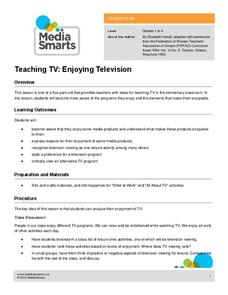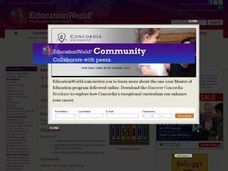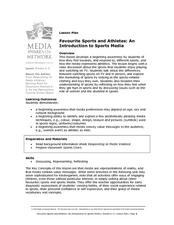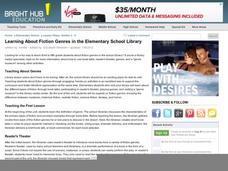Curated OER
Collaborative Literature Circle For the 21st Century
Using ichat or Edmodo 4th -6th graders participate in an inter-school literature circle. Students from two different schools pair up online through ichat and use a blog to conduct a book circle. This activity is wonderful; it fully...
Arizona State University
Journalism Lesson
Engage your pupils in a seres of journalism activities. For this journalism lesson plan, learners practice with AP style, analyze an article, practice writing leads, work with organizing information, and take a stab at writing headlines....
Michigan State University
Researching and Compiling Survey Information
Bring Internet research and social issues to your language arts class in this activity. After investigating the topic "Media Violence and How It Affects Teenagers" on the Internet, middle schoolers work in groups to compile their...
Close Up Foundation
Teach the Vote
Why is voting important? A social studies unit presents a non-partisan approach to the importance of voting, to voting laws and procedures, and to resources that voters need to become informed voters.
Curated OER
Shaking the Movers: Youth Rights and Media
Children have rights! Exploring those rights and using media to express those rights is the focus of this Media Awareness Network lesson plan. Although some of the law links reflect the Canadian Articles of The Convention, the majority...
Media Smarts
Teaching TV: Critically Evaluating TV
Mercer Mayer's There's a Nightmare in my Closet creates the framework for a specific discussion of nightmares generated by TV and a more general discussion of other emotions evoked by programs.
Media Smarts
Teaching TV: Enjoying Television
What makes a TV program enjoyable? As an introduction to media analysis, kids identify their favorite programs and the elements they find engaging.
Media Smarts
Teaching TV: Television Techniques
As part of a five-lesson plan unit on how television uses technology and film techniques to communicate meaning, elementary students create their own media productions that demonstrate their understanding of these concepts.
Media Smarts
The Broadcast Project
As part of a unit on media studies, kids are asked to chart their viewing habits, observe the advertising that sponsors their favorite shows, and then to imagine what they would broadcast if given a block of airtime.
Curated OER
Savvy Surfers: Website Evaluation and Media Literacy
Sixth graders strengthen their understanding of what a high quality website is composed of. Learners evaluate three websites for accuracy, credibility, and reliability by completing a chart.
Museum of Tolerance
Developing Media Literacy
To protect young people from questionable content, many schools limit access. This resource suggests that because learners can so readily avail themselves to unrestricted Internet access, it is vital for 21st century learners to develop...
Curated OER
Alphabetize For A Reason
Learners organize information by using the alphabet. Students organize materials alphabetically. Learners alphabetize with the first, second and third letters of a set of words. Students discover applications for alphabetical order.
Curated OER
Cyberbullying and Civic Participation
Encourage your class to create rules and regulations for cyberbullying. Learners explore civic participation by thinking about the rules and regulations already in place in their lives and studying Canada's Canada Gazette. As a final...
Curated OER
Favorite Sports and Athletes: an Introduction to Sports Media
Even young children watch sports and like team logos and products. It's never too early to think critically about what's onscreen. This exercise develops awareness that media communicate values (i.e. who participates in sports and who...
Curated OER
Video Game Violence: Explore Possible Impacts
Introduce middle schoolers to the issue of video game violence with a multifaceted approach. Learners complete a gaming survey, as well as read and discuss a news feature about violent video game sales and a handout on stimulus...
Curated OER
Learning About Fiction Genres in the Elementary School Library
Teaching about fiction genres can be challenging. The instructional activity here, designed for library media specialists, offers a fun way to do it. In the instructional activity, learners visit the library and learn about the...
Visa
Consumer Awareness
Help your pupils become wise consumers and avoid becoming targets for consumer scams and fraud. Here you'll find a PowerPoint presentation, instructional guidelines, worksheets, and suggested activities for developing shopper strategies...
Ontario
Lesson Plan for Media Literacy
Fourth graders analyze posters that communicate an "active living" message, otherwise known as a public service announcement. Children identify techniques that are used in creating media texts including topic, purpose, and...
Maryland Department of Education
The Concept of Identity Lesson 8: Propaganda in Visual Media
Visual and print propaganda are featured in a lesson that asks readers of A Separate Peace to examine the techniques used in propaganda from World War I, World War II, presidential elections, and in the novel.
PBS
Broadcast News
Just because a story is on the news doesn't mean it's being presented fairly. Analyze news broadcasts with a instructional activity focused on evaluating television journalism. At home, kids watch a news show and note the stories...
Museum of the Moving Image
What Makes an Effective Ad?
As an introduction to a series of related resources that examine political advertising and commercials from 1952-2012, class members use the provided rubric to analyze and rate the effectiveness of the emotion, persuasion, factual...
Museum of Tolerance
Influence of Media
We are bombarded with media images expressly designed to influence viewers. Learning how to analyze the intended effects of these images is essential and the focus of an activity that asks viewers to use the provided questions to guide...
Brown University
Following the U.S. Presidential Election
Election years provide the opportunity to evaluate news media as well as the next prospective president. High schoolers read about the same event in several different news sources, varying in type, origin, and political leaning, before...
ReadWriteThink
Defining Literacy in a Digital World
What skills are necessary to interact with different types of text? Twenty-first century learners live in a digital world and must develop a whole new set of skills to develop media literacy. Class members engage in a series of...
Other popular searches
- Teacher Resources
- Teacher Websites
- Substitute Teacher Resources
- Teachers in Space
- Teachers Sites
- Science Teacher Resources
- Substitute Teachers
- Teacher Education
- Teacher Resources Tenses
- Teacher Appreciation
- Math Teacher Resources
- Student Teacher

























